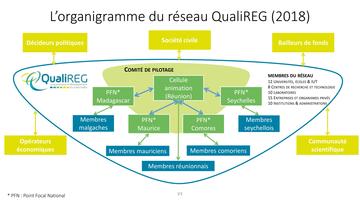Our Chart
The coordination unit
It coordinates the activities of the network in relation with the members concerned. In consultation with the National Focal Points, it defines and validates the strategic orientations of the network and leads the annual steering committees. Among its various missions, it facilitates the networking of Indian Ocean stakeholders involved in research, development and innovation; it ensures the visibility of the network's activities thanks to the QualiREG website, social media and the sending of a quarterly newsletter, and it identifies opportunities for financing and setting up projects for the members of the network.
The coordination unit is composed of 4 persons from CIRAD Reunion.
National Focal Points (NFP)
The National Focal Points liaise between the coordination unit and the members of the network in their country. With the network's coordination unit, they participate in the definition of the strategic orientations of the network and in the elaboration of the annual steering committees. In particular, the NFP are in charge of identifying the needs, the opportunities for projects and funding and the relevant actors in their country ; facilitating relations and communication between the actors of their country and the QualiREG network to bring out new projects and promoting the network among beneficiaries, decision-makers and donors.
There are currently 2 Malagasy NFP, 2 Mauritian NFP, 2 Comorian NFP and 1 Seychellois NFP.
The steering committee
It is composed of the members of the coordination unit and the National Focal Points. The steering committee meets once or twice a year to give feedback on the activities of the past year, to highlight any possible dysfunctions or obstacles to the proper execution of the projects carried by the network and to (re)define the scientific strategy of the network for the coming years.
Members
The QualiREG network has nearly 50 members in Réunion, Madagascar, Mauritius (and Rodrigues), Comoros, Mayotte, Seychelles, South Africa and mainland France. Among these institutions, there are research centers, laboratories, universities, enterprises, NGOs, producer organizations, public services, etc.
--> Interested in joining the network ?

